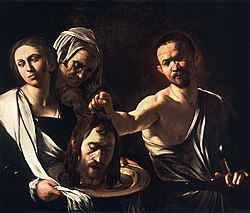Beheading of Saint John the Baptist | |
|---|---|
 | |
| |
| Venerated in | |
| Feast | 29 August (Translation of Relic) |
| Attributes | The severed head of Saint John the Baptist on a round silver platter, often held by Salome or Herod Antipas |


The beheading of John the Baptist, also known as the decollation of Saint John the Baptist or the beheading of the Forerunner, is a biblical event commemorated as a holy day by various Christian churches. According to the New Testament, Herod Antipas, ruler of Galilee under the Roman Empire, had imprisoned John the Baptist because he had publicly reproved Herod for divorcing his first wife and unlawfully taking his sister-in-law (his brother's wife) as his second wife Herodias. He then ordered him to be killed by beheading.
As a non-Biblical source, Jewish historian Josephus also recounts that Herod had John imprisoned and killed due to "the great influence John had over the people", which might persuade John "to raise a rebellion". Josephus also writes that many of the Jews believed that Herod's later military disaster was God's punishment for his treatment of John.[1]